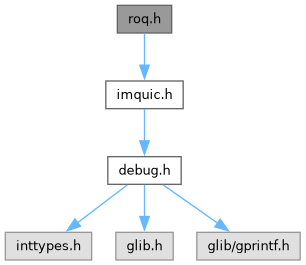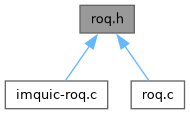imquic RoQ public interface (headers) More...
#include "imquic.h"

Go to the source code of this file.
Typedefs | |
| typedef enum imquic_roq_multiplexing | imquic_roq_multiplexing |
| RTP Over QUIC multiplexing modes. | |
Enumerations | |
| enum | imquic_roq_multiplexing { IMQUIC_ROQ_DATAGRAM , IMQUIC_ROQ_STREAM } |
| RTP Over QUIC multiplexing modes. More... | |
Functions | |
| const char * | imquic_roq_multiplexing_str (imquic_roq_multiplexing type) |
| Helper function to serialize to string the name of a imquic_roq_multiplexing property. | |
RoQ endpoints management | |
| imquic_server * | imquic_create_roq_server (const char *name,...) |
Method to create a new RoQ server, using variable arguments to dictate what the server should do (e.g., port to bind to, ALPN, etc.). Variable arguments are in the form of a sequence of name-value started with a IMQUIC_CONFIG_INIT and ended by a IMQUIC_CONFIG_DONE , e.g.: | |
| imquic_client * | imquic_create_roq_client (const char *name,...) |
Method to create a new RoQ client, using variable arguments to dictate what the client should do (e.g., address to connect to, ALPN, etc.). Variable arguments are in the form of a sequence of name-value started with a IMQUIC_CONFIG_INIT and ended by a IMQUIC_CONFIG_DONE , e.g.: | |
| void | imquic_set_new_roq_connection_cb (imquic_endpoint *endpoint, void(*new_roq_connection)(imquic_connection *conn, void *user_data)) |
| Configure the callback function to be notified about new RoQ connections on the configured endpoint. For a server, it will be triggered any time a client successfully connects to the server; for a client, it will be triggered when the client successfully connects to the server. | |
| void | imquic_set_rtp_incoming_cb (imquic_endpoint *endpoint, void(*rtp_incoming)(imquic_connection *conn, uint64_t flow_id, uint8_t *bytes, size_t blen)) |
| Configure the callback function to be notified about incoming RTP packets, independently of the multiplexing mode. The callback function will only include the relevant data, that is the RoQ flow ID and a buffer containing the RTP packet itself. | |
| void | imquic_set_roq_connection_gone_cb (imquic_endpoint *endpoint, void(*roq_connection_gone)(imquic_connection *conn)) |
| Configure the callback function to be notified when an existing RoQ connection handled by this endpoint has been closed/shut down. | |
Using the RoQ API | |
| size_t | imquic_roq_send_rtp (imquic_connection *conn, imquic_roq_multiplexing multiplexing, uint64_t flow_id, uint8_t *bytes, size_t blen, gboolean close_stream) |
Helper to send RTP packets over QUIC, using one of the supported imquic_roq_multiplexing modes. The method only requires the flow ID (to allow the recipient to identify the RTP session) and the RTP packet to send (buffer and size). The stack will then internally frame the packet as needed, using the right multiplexing mode and optionally creating a new STREAM for the purpose. | |
imquic RoQ public interface (headers)
Public interface to the RTP Over QUIC (RoQ) native support in the imquic library. This is where public functions are callbacks to interact with the RoQ features of the library are defined.
| typedef enum imquic_roq_multiplexing imquic_roq_multiplexing |
RTP Over QUIC multiplexing modes.
| imquic_client * imquic_create_roq_client | ( | const char * | name, |
| ... ) |
Method to create a new RoQ client, using variable arguments to dictate what the client should do (e.g., address to connect to, ALPN, etc.). Variable arguments are in the form of a sequence of name-value started with a IMQUIC_CONFIG_INIT and ended by a IMQUIC_CONFIG_DONE , e.g.:
imquic_client *client = imquic_create_roq_client("roq-client",
IMQUIC_CONFIG_INIT,
IMQUIC_CONFIG_TLS_CERT, cert_pem,
IMQUIC_CONFIG_TLS_KEY, cert_key,
IMQUIC_CONFIG_TLS_PASSWORD, cert_pwd,
IMQUIC_CONFIG_REMOTE_HOST, "127.0.0.1",
IMQUIC_CONFIG_REMOTE_PORT, 9000,
IMQUIC_CONFIG_DONE, NULL);
to create a QUIC client that will automatically negotiate RoQ. Again, as with imquic_create_client, this will only create the resource, but not actually start the connection: before doing that, you'll need to configure the callbacks for the events you're interested in (in this case, RoQ specific), and then use imquic_start_endpoint to start the start the QUIC client (which will attempt a connection).
| [in] | name | The endpoint name (if NULL, a default value will be set) |
| imquic_server * imquic_create_roq_server | ( | const char * | name, |
| ... ) |
Method to create a new RoQ server, using variable arguments to dictate what the server should do (e.g., port to bind to, ALPN, etc.). Variable arguments are in the form of a sequence of name-value started with a IMQUIC_CONFIG_INIT and ended by a IMQUIC_CONFIG_DONE , e.g.:
imquic_server *server = imquic_create_roq_server("roq-server",
IMQUIC_CONFIG_INIT,
IMQUIC_CONFIG_TLS_CERT, cert_pem,
IMQUIC_CONFIG_TLS_KEY, cert_key,
IMQUIC_CONFIG_TLS_PASSWORD, cert_pwd,
IMQUIC_CONFIG_LOCAL_PORT, 9000,
IMQUIC_CONFIG_DONE, NULL);
to create a QUIC server that will automatically negotiate RoQ. Again, as with imquic_create_server, this will only create the resource, but not actually start the server: before doing that, you'll need to configure the callbacks for the events you're interested in (in this case, RoQ specific), and then use imquic_start_endpoint to start the QUIC server (which will wait for incoming connections).
| [in] | name | The endpoint name (if NULL, a default value will be set) |
| const char * imquic_roq_multiplexing_str | ( | imquic_roq_multiplexing | type | ) |
Helper function to serialize to string the name of a imquic_roq_multiplexing property.
| type | The imquic_roq_multiplexing property |
| size_t imquic_roq_send_rtp | ( | imquic_connection * | conn, |
| imquic_roq_multiplexing | multiplexing, | ||
| uint64_t | flow_id, | ||
| uint8_t * | bytes, | ||
| size_t | blen, | ||
| gboolean | close_stream ) |
Helper to send RTP packets over QUIC, using one of the supported imquic_roq_multiplexing modes. The method only requires the flow ID (to allow the recipient to identify the RTP session) and the RTP packet to send (buffer and size). The stack will then internally frame the packet as needed, using the right multiplexing mode and optionally creating a new STREAM for the purpose.
| [in] | conn | The RoQ connection to send the RTP packet on |
| [in] | multiplexing | The imquic_roq_multiplexing mode to use for sending this packet |
| [in] | flow_id | The RoQ flow ID |
| [in] | bytes | The buffer containing the RTP packet |
| [in] | blen | The size of the buffer to send |
| [in] | close_stream | Whether the STREAM should be closed after sending this packet (ignored when using DATAGRAM as a multiplexing mode) |
| void imquic_set_new_roq_connection_cb | ( | imquic_endpoint * | endpoint, |
| void(* | new_roq_connection )(imquic_connection *conn, void *user_data) ) |
Configure the callback function to be notified about new RoQ connections on the configured endpoint. For a server, it will be triggered any time a client successfully connects to the server; for a client, it will be triggered when the client successfully connects to the server.
| endpoint | The imquic_endpoint (imquic_server or imquic_client) to configure |
| new_roq_connection | Pointer to the function that will be invoked on the new RoQ connection |
| void imquic_set_roq_connection_gone_cb | ( | imquic_endpoint * | endpoint, |
| void(* | roq_connection_gone )(imquic_connection *conn) ) |
Configure the callback function to be notified when an existing RoQ connection handled by this endpoint has been closed/shut down.
| endpoint | The imquic_endpoint (imquic_server or imquic_client) to configure |
| roq_connection_gone | Pointer to the function that will be invoked when a RoQ connection is gone |
| void imquic_set_rtp_incoming_cb | ( | imquic_endpoint * | endpoint, |
| void(* | rtp_incoming )(imquic_connection *conn, uint64_t flow_id, uint8_t *bytes, size_t blen) ) |
Configure the callback function to be notified about incoming RTP packets, independently of the multiplexing mode. The callback function will only include the relevant data, that is the RoQ flow ID and a buffer containing the RTP packet itself.
| endpoint | The imquic_endpoint (imquic_server or imquic_client) to configure |
| rtp_incoming | Pointer to the function that will be invoked when there's a new incoming RTP packet |